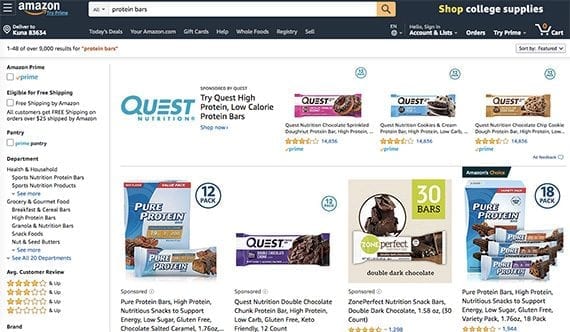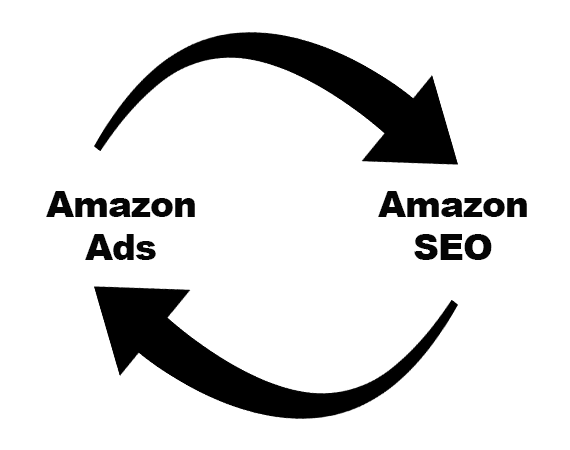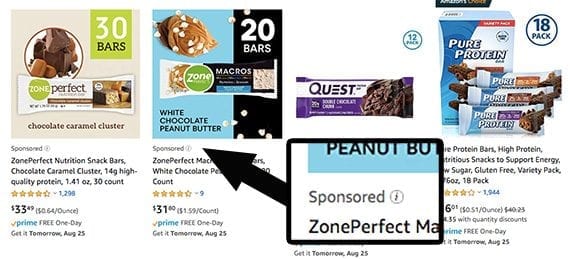Amazon Ads will not only help spur marketplace sales but could start a virtuous cycle of revenue growth.
In some ways, the Amazon marketplace is momentum-driven. Unlike Google or Bing, Amazon isn’t interested in presenting informational or entertaining search results. It wants to make sales.
For this reason, Amazon favors high-converting products on its search result pages. One of the ways to improve a product’s conversions and sales is to advertise it on the platform. The more sales it gets, the more likely that product is to be included in organic results and the virtuous cycle begins.

Amazon’s organic search results favor the best-selling products relevant to the query. In this case, that means being the first organic result for “protein bars” out of 9,000.
Marketplace Search
“You know you can spend all the money you have on Google Ads and be dominant in the number one position and get a lot of clicks [but] it doesn’t impact your organic ranking,” said Evan Facinger, director of paid advertising at Wisconsin-based Convert More Marketing.
“But Amazon is more of a closed ecosystem, and one of the biggest factors for the search engine side of things is product sales and the sales velocity, you know, the overall conversion rate….Amazon wants to show the actual products that are going to sell the most. So you can directly impact your organic rankings through advertising,” said Facinger, who will be presenting talks on Amazon advertising and organic search at the Pubcon 2019 conference.
In this way, ads and Amazon search engine optimization can work together to increase sales.

Buying ads on Amazon should improve sales for the targeted products. When sales improve, those products will climb in organic rankings. When a product ranks better, sellers can reallocate ad investments to other keyword phrases and other products, creating a virtuous cycle of revenue growth.
New Products
The ads-to-search cycle is especially helpful for new products.
Say, for example, that your brand has just launched a plant-based protein bar that you listed on Amazon’s marketplace. It will probably not be displayed near the top of search results for “protein bars,” but advertising that product could be a momentum starter to elevate organic rankings.
This would be the case for a new direct-to-consumer product like the aforementioned protein bar or for a retailer who is the first to bring a vendor’s products to the marketplace.
The virtuous cycle then continues as good organic search performance could reduce advertising costs for some keyword phrases and allow those advertising dollars to be invested in a new set of keywords targeting another product your company sells.
Ads Boost Sales
To be clear, Amazon Ads don’t just fuel search rankings on the platform. They will likely increase sales directly.
For small-and-mid-sized ecommerce businesses, Facinger recommends starting with Amazon Sponsored Products ads, which appear inline with search results.

Sponsored Products ads look almost identical to organic search results. Only the tiny “Sponsored” label identifies them.
It is common for Sponsored Products ads to appear in the first row of results, in the middle of results, and even at the bottom of the results page.
Clear Attribution
Sponsored Product Ads provide “a pretty good, trackable return on investment,” Facinger said. “That’s a big thing for smaller brands. One of the things that makes Amazon pretty exciting, too, is the attribution is linear. You can really see how your ads are performing — what that click does — your ACoS, which is your advertising cost of sales.”
“Unlike in Google where there are multiple clicks a lot of times [and] your attribution [is complex]…with Amazon it is inside that ecosystem so you can really track your sales and your advertising…and make more data-driven decisions,” Facinger said.
“You can measure how many sales are resulting from those clicks. How much am I spending per click? So as a small business you want to pay attention to those numbers to make sure that it is making money for you.”
This direct attribution may make it relatively easier to optimize Amazon Ads for sales.
As an example, if your company’s Sponsored Products ad is sending traffic to the product detail page but not converting, you know to improve that page.
Perhaps you need better content. That might mean a better product description or additional product specifications. You could need improved photography; maybe your existing images are not telling the story.
Brands vs. Resellers
Your ability to control the product detail page depends on whether your company has its own branded products or sells products from others.
For resellers, “you are basically making suggestions for changes to that product detail page,” Facinger said. “The person who has that trademark … their changes are going to stick.”
Thus a traditional retailer may have to work harder to optimize the product detail page than would a direct-to-consumer brand.
A second concern for resellers is the ability to purchase a Sponsored Products ad — your company must first control the “buy box” for a given product. This means that you must effectively be the product’s default seller.
Thus, start your company’s virtuous cycle, if you will, by promoting a product you can advertise. Again, the ad should lead to better organic ranking, which may eventually make advertising investments available for additional keywords and products.






